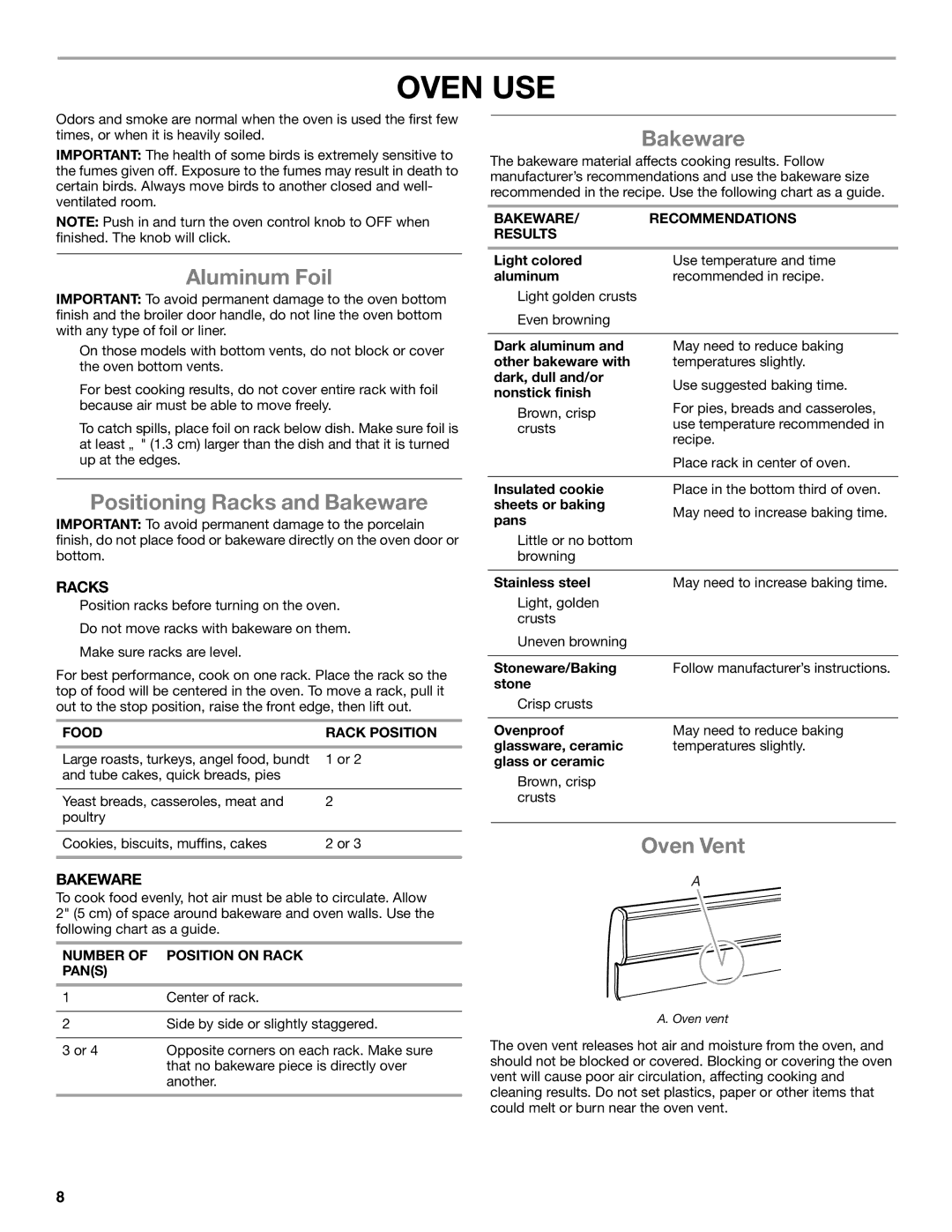
OVEN USE
Odors and smoke are normal when the oven is used the first few times, or when it is heavily soiled.
IMPORTANT: The health of some birds is extremely sensitive to the fumes given off. Exposure to the fumes may result in death to certain birds. Always move birds to another closed and well- ventilated room.
NOTE: Push in and turn the oven control knob to OFF when finished. The knob will click.
Aluminum Foil
IMPORTANT: To avoid permanent damage to the oven bottom finish and the broiler door handle, do not line the oven bottom with any type of foil or liner.
■On those models with bottom vents, do not block or cover the oven bottom vents.
■For best cooking results, do not cover entire rack with foil because air must be able to move freely.
■To catch spills, place foil on rack below dish. Make sure foil is at least ¹⁄₂" (1.3 cm) larger than the dish and that it is turned up at the edges.
Positioning Racks and Bakeware
IMPORTANT: To avoid permanent damage to the porcelain finish, do not place food or bakeware directly on the oven door or bottom.
RACKS
■Position racks before turning on the oven.
■Do not move racks with bakeware on them.
■Make sure racks are level.
For best performance, cook on one rack. Place the rack so the top of food will be centered in the oven. To move a rack, pull it out to the stop position, raise the front edge, then lift out.
FOOD | RACK POSITION |
Large roasts, turkeys, angel food, bundt | 1 or 2 |
and tube cakes, quick breads, pies |
|
|
|
Yeast breads, casseroles, meat and | 2 |
poultry |
|
|
|
Cookies, biscuits, muffins, cakes | 2 or 3 |
|
|
BAKEWARE
To cook food evenly, hot air must be able to circulate. Allow 2" (5 cm) of space around bakeware and oven walls. Use the following chart as a guide.
NUMBER OF POSITION ON RACK
PAN(S)
1Center of rack.
2Side by side or slightly staggered.
3 or 4 | Opposite corners on each rack. Make sure |
| that no bakeware piece is directly over |
| another. |
|
|
Bakeware
The bakeware material affects cooking results. Follow manufacturer’s recommendations and use the bakeware size recommended in the recipe. Use the following chart as a guide.
BAKEWARE/ | RECOMMENDATIONS |
RESULTS |
|
|
|
Light colored | ■ Use temperature and time |
aluminum | recommended in recipe. |
■Light golden crusts
■Even browning
Dark aluminum and | ■ | May need to reduce baking | |
other bakeware with |
| temperatures slightly. | |
dark, dull and/or | ■ | Use suggested baking time. | |
nonstick finish | |||
■ For pies, breads and casseroles, | |||
■ Brown, crisp | |||
| use temperature recommended in | ||
crusts |
| ||
| recipe. | ||
|
| ||
| ■ Place rack in center of oven. | ||
|
|
| |
Insulated cookie | ■ | Place in the bottom third of oven. | |
sheets or baking | ■ | May need to increase baking time. | |
pans | |||
|
| ||
■Little or no bottom browning
Stainless steel | ■ May need to increase baking time. |
■Light, golden crusts
■Uneven browning
Stoneware/Baking | ■ Follow manufacturer’s instructions. | |
stone |
| |
■ | Crisp crusts |
|
|
| |
Ovenproof | ■ May need to reduce baking | |
glassware, ceramic | temperatures slightly. | |
glass or ceramic |
| |
■ | Brown, crisp |
|
| crusts |
|
Oven Vent
A
A. Oven vent
The oven vent releases hot air and moisture from the oven, and should not be blocked or covered. Blocking or covering the oven vent will cause poor air circulation, affecting cooking and cleaning results. Do not set plastics, paper or other items that could melt or burn near the oven vent.
8
